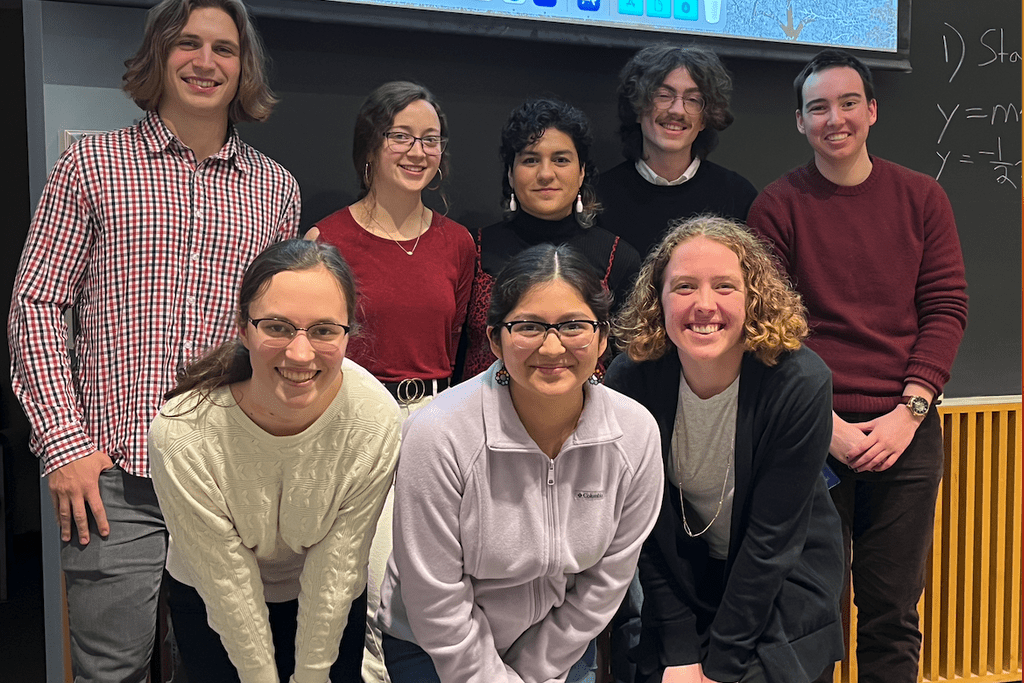How applicable is algebra to everyday life? One Carleton Math Comps Group set out to answer this question for two classes of Northfield students this fall and winter. Their Comps project, titled “Unpacking Algebra: 98 Lessons with Applications,” is a 360 page book of lesson plans with real world applications for algebra and geometry, made in collaboration with two teachers in the Northfield Public Schools. This comps project was an Academic Civic Engagement (ACE) Comps opportunity, advised by Professor Deanna Haunsperger.

Over the course of fall and winter terms, the eight senior Math majors on this project (Andrea Ramos, Isaac Fried, Michael Dreger, Michaela Polley, Rachel Ziems, Raine Bernhard, Riley Madsen, and Tia Ahmed) identified core algebra skills and researched their applications in a wide range of careers and everyday situations. “I think one of the biggest questions that people have for math is when am I ever going to need to know this?” said Tia Ahmed. “It was just really awesome that almost every single topic we could apply to some real life topic.” For example, the lesson plan for the concept of Absolute Value uses Sea Level to explain why it might be helpful to know the distance a number is from zero. Other real world applications referenced in the lesson plans include shopping, population growth, smoothie recipes, and city planning.
For the Carleton students, this project also provided them with a way to apply their studies outside the classroom. The ACE component “made it [Comps] more real and also more compelling, I think.” said Raine Bernhard. “When we went to visit the kids in the classrooms, I thought ‘Oh, these are the kids who I’m designing lessons for.’ Had there not been the community engagement aspect, it would have been a lot trickier for me to see how what I was doing mattered.” As advisor Deanna Haunsperger said, “This isn’t work that will get put in a drawer never to be seen again — this is work that can make a positive impact in people’s lives.”
Many students who worked on this project are interested in becoming teachers. “It was a really cool opportunity for us to have it [an ACE comps] in the Math major.” said Tia Ahmed. “There’s not always Math education comps.” In addition to creating the lessons, students also went into classrooms to present them. These presentations helped students figure out what worked and didn’t work. They were also an opportunity for students to reflect on their own math education experiences. “Going back to some of these topics it was like wait, how did I learn this?” said Tia Ahmed. “I think a lot of our focus on these lessons was kind of giving students more of like why are you doing this? Not just like here’s the formula. A little bit more of here’s how we got there. And so that was really cool. I don’t feel like I had that in my math experience as a child.”
Raine Bernhard agreed: “I’m a Math major. I know a lot of math, especially algebra, and certain things come easier to me than they might for a lot of different people. Especially considering I’m a senior Math major, it kind of helped me get back to ‘Okay, this is the level of math that people have. This is where it might be confusing. How can I help them figure that out?’”
The lesson plans also included a Spanish language component in response to needs expressed by the teachers. Teachers found that teaching algebra concepts and real life applications was even more difficult for English Language Learners: students and teachers didn’t have a common vocabulary to work with. The Comps group, led by Andrea Ramos, worked to meet this need by creating a “Spanish Language Resource” section that provides translations for common algebra terms.
When asked if they would recommend an ACE Comps to other students, both Raine and Tia enthusiastically said yes. “It’s definitely fun to see exactly what you’re contributing beyond academia,” Raine added.
Deanna Haunsperger encourages Carleton students to seek out ACE course opportunities. “After Carleton, you will be asked, probably many times in your life, to talk about your education and something that was meaningful during these years. Investing your time and energy into your community is something that anyone can relate to — your aunt, your future employer, your children. Make the most of your ACE comps experience, and you can show these people that what you studied at Carleton is relevant in their lives, too.”
Discover other examples of the Carleton Math and Stats department’s community-engaged work. For more information about advising an ACE Comps, please reach out to Emily Seru (eseru@carleton.edu).
A special thanks to ACE fellows Lily Horne and Sophie Baggett for this piece.